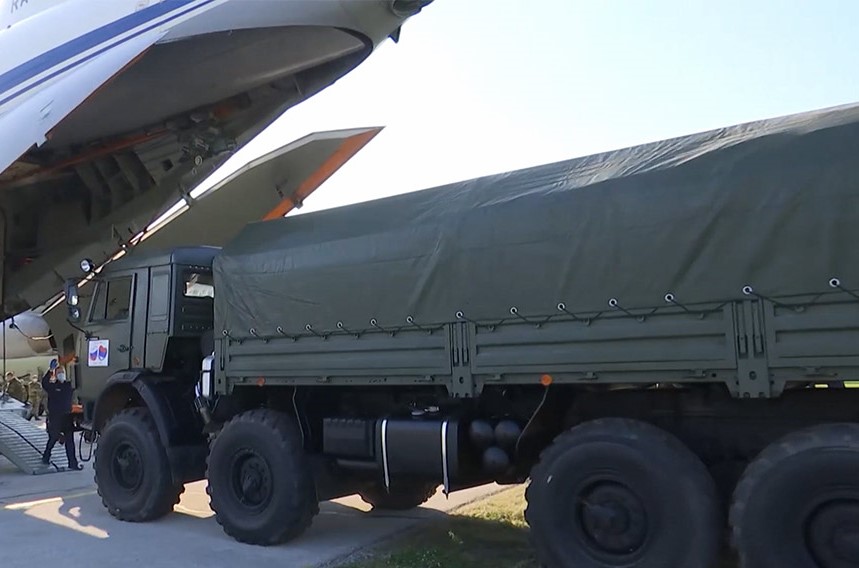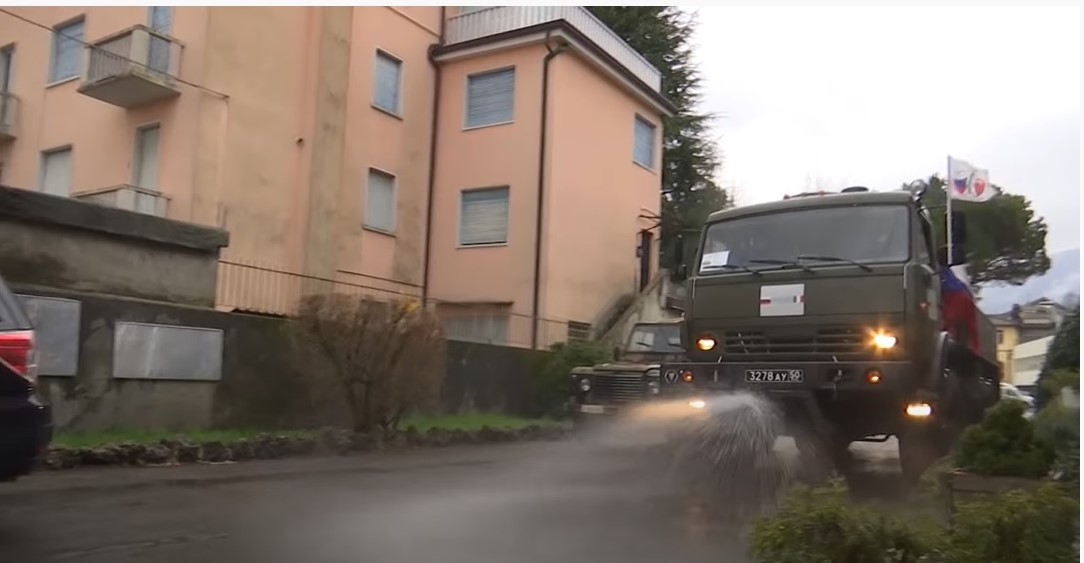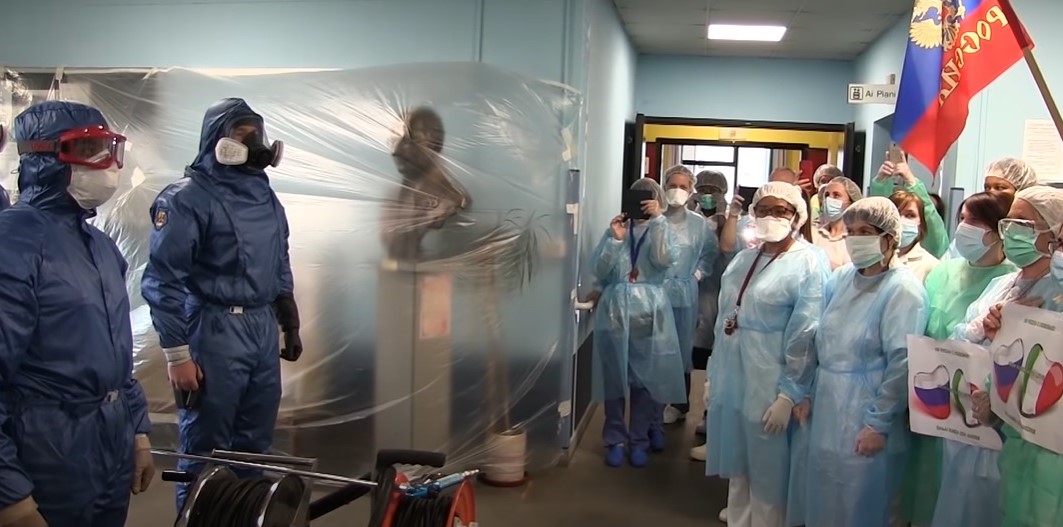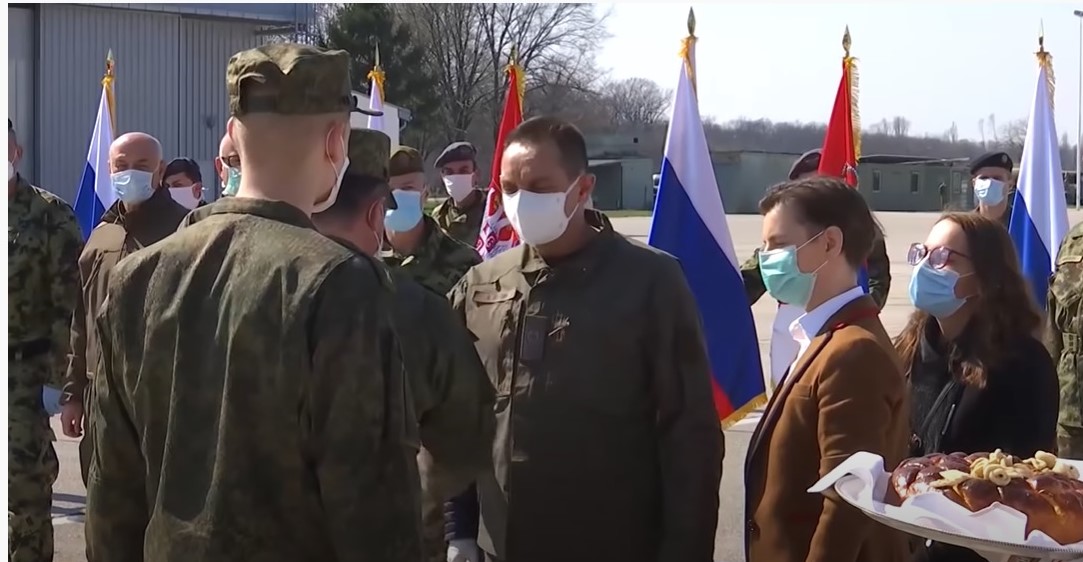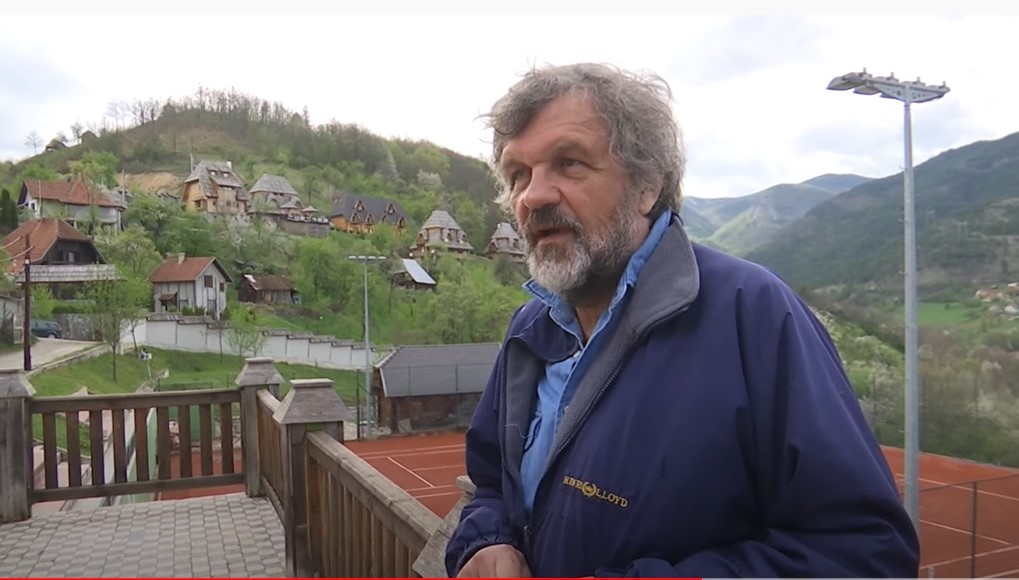At the beginning of May 2020, the Russian Federation took the sixth position among the countries of the world in terms of the number of infected persons with COVID-19, there were 155 000. Every day the number of infected in Russia increases by 10 500 persons, but in this difficult period for the country instead of directing all resources to help its own citizens, the Russian authorities decided to take on the role of “savior of Europe”.
The Russian Federation organizes and conducts so-called “humanitarian operations” on the territory of European countries by forces and means of units of its armed forces, the aim of which is to fight against the coronavirus infection. The real purpose of such operations, however, is different.
What motivated the Kremlin’s actions in the provision of so-called “humanitarian aid”, why the Ministry of Defence of the Russian Federation is responsible for the humanitarian convoys, why they are formed and accompanied only by the military, what the Russian military personnel is doing in Europe and whether European countries really seek such assistance, these were the questions resolved by analysts of the Center for Security Studies “CENSS”.
The tradition of sending military units with an aim to provide “humanitarian aid” has been formed in Russia for decades, which is how the Russian authorities often explain “legal” presence of their military units on the territory of other states. It is worth noting, that in 2006, the Russian Federation deployed more than 300 military engineers and equipment on a humanitarian mission to Lebanon for several months to build eight bridges in Lebanon that were destroyed during the conflict with Israel.[1] To protect its own military personnel, they deployed two reconnaissance units of the battalions “Vostok” and “Zapad” of the Ministry of Defence of the Russian Federation (53 servicemen), formed of Chechen residents, and sent small arms with them.[2] Such humanitarian aid cost the federal budget of Russia at that time RUB 500 million. In 2007, during the Munich Security Conference, Volodymyr Putin was asked about the advisability of deployment of Chechen military personnel to Lebanon. At that time, he said that the local residents have warmly welcomed Russian military engineers, and the areas where they worked were populated by Muslims, so Muslims had to protect them [3]
Nowadays, during the coronavirus pandemic, the Russian Federation authorities again decided to take advantage of the situation and deploy military units under the guise of “humanitarian convoys” to European countries, namely Italy, Serbia, Bosnia and Herzegovina. The humanitarian mission is perhaps the only opportunity for the Russian military personnel to stay on the territories of European countries, including those dominated by the North Atlantic Treaty Organisation (NATO).
Humanitarian Aid to Italy
On March 22, Italian Prime Minister Giuseppe Conte announced the strengthening of quarantine measures in the country, closing almost all businesses except critical infrastructure, because about 800 persons died the day before from the coronavirus. And the very next day planes of Russian Aerospace Defence Forces flew to Italy to help Italians fight the virus. [4] There were 14 Russian IL-76 military transport aircrafts with 120 military specialists on board. All medics were officers of the Russian army. According to the official information of the Ministry of Defence of Italy, the Russian Federation deployed their epidemiologists, virologists, 22 “KAMAZ” trucks, TMS-65 (special heat treatment machine) and aerosol disinfection complex KDA “Orlan”, 100 devices for artificial respiration and 500 000 masks.
Interestingly enough, the Russians filmed every step they took in Italy, taking a film crew with them. The Ministry of Defence of the Russian Federation has filmed a number of movie clips about the Russian military personnel, necessarily with tricolours, disinfecting the streets of Italian cities, nursing homes, as well as filmed the work with medical personnel in hospitals.[5] For example, in Boarding House named after John Paul I for elderly persons in Seriate the process of disinfection begins with applause, joint listening to the anthem of Russia, and workers of the boarding house held a flag of Russia and posters with an inscription: from Russia with love.[6] This is the slogan of the Russian humanitarian campaign.
Is Russia guided only by altruistic considerations?
Just a few days after the arrival of the Russian humanitarian cargo to Italy, the Italian newspaper “La Stampa”[7] citing its own high-ranking sources among officials reported that 80% of what Russia sends is “absolutely unnecessary, or little needed” for Italy to fight against COVID-19. There is a concern expressed by the newspaper that all the specialists who arrived are military personnel, and that the operation is coordinated by the Ministry of Defence of the Russian Federation, not the Ministry of Health. All military personnel are high ranking: generals, colonels, majors, and “move freely on the territory of Italy, a few steps away from NATO bases”.
At the same time, amidst the humanitarian aid to Italy, Russian mass media actively promote the idea that the U.S. and the EU are impassive. Russian experts themselves speak about one of the goals of the deployment of military personnel in Italy: “Special equipment will be run in difficult circumstances. We will not only assist Italy to overcome the coronavirus outbreak, but also get extra-class specialists, which will be invaluable”.[8] Some openly note that the troops need training, and in Italy there was real work in conditions close to combat.[9]
The goals of the Russian Federation in the situation with the provision of humanitarian assistance to Italy, as always, are multidimensional. Recently it was reported that after the Russian Federation had sent humanitarian aid to Italy, President of the Foreign Affairs Committee of the Senate Vito Rosario Petrocelli received a letter from Chairman of the State Duma’s Committee on International Affairs Leonid Slutsky, requesting to renounce the sanctions policy. [10]
In the letter, Slutsky asked to put pressure on Brussels and “renounce the destructive policy of sanctions” (for all countries) amidst the fight against coronavirus. The peculiarities of the Russian political game are manifesting once again: the letter is not sent from the State Duma, the President or the Government, which have legislatively defined powers in the field of international relations, but from a person (although a high-ranking official) whose status allows the official authorities in the Kremlin to confirm or deny such information at any time, depending on the reaction of external players to it.
Humanitarian Aid to the Balkans
In early April, the Russians deployed 11 military aircrafts with around 90 servicemen on board, medical equipment, protective equipment and 16 units of military equipment to Serbia, again stressing in an official statement that Serbia asked for assistance. The Russian mass media cited Serbian President Aleksandar Vucic: “Despite the crisis in the world and Russia, Putin is thinking about fraternal people of Serbia”.[11] Russian state mass media gave rise to the arguments on how the EU turned its back on Serbia: it banned the sale of medicine and equipment, and there was no pan-European solidarity in the times of the pandemic.
It is clear that not all messages are intended for ordinary citizens; in some cases, signals for the military and political command of other states are also being articulated through the state Russian media. Therefore, in one of the articles, along with praising the Russian humanitarian aid that arrived by military aircrafts, it was noted that according to previous contracts, Russia must supply 20 armoured personnel carriers, 30 tanks and other military equipment to Serbia, which were opposed by NATO Member States. It was noted in the Russian newspaper that it was quite possible that some of this equipment would be in the disposal of Belgrade sooner than NATO partners expected.[12] Let us not forget that if this scenario is implemented, under certain conditions such equipment may be used in the territory of Europe, including by the Russian military personnel for achieving its own purposes and needs.
As of May 4, 2020, according to the Ministry of Defence of the Russian Federation, the Russian military personnel have carried out a set of disinfection measures at 156 facilities in 30 cities in Serbia, including the treatment of: more than 328 buildings, 65 sections of paved roads, as well as more than 785 patients infected with COVID-19 have been examined in hospitals. It is possible to imagine how much intelligence information the Russian military personnel could have received during performance of these tasks at all these facilities.
In Serbia, Russians have also resorted to their favourite method, which is to appeal to history. During disinfection activities carried out by servicemen in the Serbian town Valjevo, a thesis was spread in the mass media on doctors from Russia who had already worked in that town during the World War I, rescuing Serbs from the Epidemic typhus..[13]
Apart from streets and medical facilities, the Russian military personnel disinfected the ethnic-village Drvengrad of the world-famous film director Emir Kusturica. [14] Of course, it wasn’t possible without filming. The Ministry of Defence of the Russian Federation recorded a video in which the director tells how much he loves Russians, and then summarizes: “the reason European Union did not come, how do you say it in Russian, ‘benefits'”. It is interesting that this statement of Kusturica is edited by a few words and what the director actually said is anyone’s guess.[15] This is how Russians once again demonstrate their position as the saviours of Europe.
In Serbia, however, there have also been criticisms towards Russian servicemen. Opposition member of the Serbian Parliament Zoran Zivkovic stated that Serbia could have handled the disinfection of the streets on its own and asked why Serbian specialists are not able to disinfect the street with alcohol and have resorted to the assistance of Russians. [16] To which Serbian Minister of Defence Aleksandar Vulin responded using traditional Russian narratives of Anti-Russian sentiment (Russophobia) accusing the deputy of hatred towards “Russian friends”. [17]
After Serbia, Russian troops launched an operation in the territory of another Balkan country, Bosnia and Herzegovina (BiH). It is important to bear in mind that in terms of the form of state structure it is a federative state, consisting of two entities: the first is Bosnia and Herzegovina and the second is Republika Srpska. The latter, inhabited by ethnic Serbs, is a constant source of undermining state sovereignty, gravitates towards Serbia and is supported by Serbian and Russian authorities.
That is why a part of the Russian military personnel that performed tasks in Serbia was redeployed from there to the territory of Republika Srpska (BiH), where a set of disinfection measures was carried out from April 9 to April 23, 2020 at 28 facilities in 11 towns of the Republika Srpska. However, it was not possible for the Russian Federation to relocate its troops to another entity of BiH, in particular to the town Mostar, where the ethnic majority of the population are Bosnian Croats. On May 1, Russia decided to deploy three IL-76 military transport aircrafts with 24 specialists and five units of special equipment on board to BiH, but the Ministry of Security of BiH did not give permission to cross the borders on the grounds that it was a military unit, the permission for which should be given exclusively by the Presidium (the collective governing body of the country).[18]
So why Russia is so generous in providing humanitarian aid to European countries, moving aside its own citizens, and why the Ministry of Defence of the Russian Federation plays a key role in this process. There are several reasons for that.
First, to create an image of Russia as a powerful but “good” state, which is able to take care not only of itself but also of other “fraternal” peoples, to help and save when other “big players” had excluded themselves. The Russian Federation uses the propaganda opportunities to promote messages about the most critical assistance, as if at a time “when the countries of Europe do not demonstrate unity”, “the EU is unable to respond quickly and effectively to crisis situations because of bureaucratic procedures”, and “The United States is in need of assistance itself”. An extensive network of Russian and foreign mass media (oriented towards the Russian Federation), bloggers, troll factories in social networks are used to disseminate information.
Secondly, to demonstrate the power as a show-off “muscle-flexing”, reminding the world once again of its military capabilities and technical, logistical, organizational potential. Russia wants to show that it is really capable to quickly and organizationally deploy its armed forces to any part of Europe, and its military personnel have excellent knowledge and skills for effective interaction and administration of tasks. This is how the Russian authorities demonstrate that they are able to use real force when necessary.
Thirdly, there is another goal for the presence of the armed forces on the territory of another state obvious for the military and security specialists, and it is to conduct military training and maneuvers in real conditions and outside of the Russian Federation, both in the territories of friendly countries (Serbia) and in the territories of NATO Member States (Italy). As a result of conducting “humanitarian operations”, the Russian Armed Forces have gained a unique experience in the following areas:
- deployment of troops and management of military units during the conduct of long-distance real-life operations from their place of disposition;
- organization of movement and manoeuvres of military units by aviation and automotive equipment, as well as logistical support;
- organization of interaction between different units, coherence of military operations;
- rehearsals and testing the ability to provide secure communication between command and units, between units and between individual servicemen;
- rehearsals on the operational provision of intelligence information to the relevant units using all available and on-hand equipment, including the capabilities of Russian satellites;
- rehearsals on mechanisms and ways of interaction between the military command and other state bodies of the Russian Federation, in particular the Foreign Intelligence Service, the Ministry of Foreign Affairs, the Federal Agency “Rossotrudnichestvo” and others;
rehearsals on carrying out information and psychological operations by the Russian Armed Forces using the capabilities of mass media and social networks.
[1] https://www.1tv.ru/news/2006-10-05/217459-v_livane_rossiyskie_spetsialisty_budut_vosstanavlivat_razrushennye_mosty
[2] https://rg.ru/2006/12/06/livan.html
[3] http://special.kremlin.ru/events/president/transcripts/24034
[4] https://www.interfax.ru/world/700585
[5] https://www.youtube.com/watch?v=ZVNhxtPdBzk
[6] https://www.youtube.com/watch?v=UXsPDUpChg0
[7] https://inosmi.ru/politic/20200326/247137810.html
[8] https://www.mk.ru/politics/2020/03/23/eksperty-raskryli-obemy-rossiyskoy-pomoshhi-italii-v-borbe-s-koronavirusom.html
[9] https://zen.yandex.ru/media/id/5af2cba1a815f14484527b8b/edut-edut-po-italii-nashi-kda-5e7bec9544566d763d5ebf57
[10] https://www.linkiesta.it/wp-content/uploads/2020/05/Lettera-nr.1072-del-27.04.2020.pdf
[11] https://www.interfax.ru/world/702284
[12] https://tass.ru/obschestvo/8374961/amp?additional-loaded-page=true
[13] https://tass.ru/mezhdunarodnaya-panorama/8170135/amp
[14] https://rg.ru/2020/04/30/rossijskie-voennye-v-serbii-proveli-dezinfekciiu-etnoderevni-emira-kusturicy.html
[15] https://www.youtube.com/watch?v=5LJ6Krk_GVs
[16] https://regnum.ru/news/polit/2932845.html
[17] https://nsn.fm/policy/ministr-oborony-serbii-otchital-deputata-za-oskorblenie-rossiiskih-voennyh
[18] https://www.rbc.ru/politics/02/05/2020/5ead299e9a79472d7a85e85b


